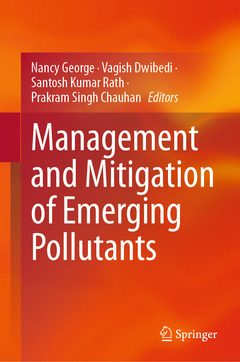Management and Mitigation of Emerging Pollutants, 1st ed. 2023

This book offers a comprehensive overview of the environmental challenges posed by emerging pollutants and the innovative strategies available for their management. Divided into 16 chapters, the book begins with an introduction to the origin and management of both inorganic and organic contaminants, offering a detailed examination of their sources and the potential risks they pose to ecosystems. It also explores current regulations and management practices aimed at mitigating their impact. In the following chapters, experts in the field cover topics such as conventional wastewater treatment methods for the removal of emerging pollutants, biotechnology-based strategies for the removal of emerging contaminants, microbial electro-deionization technologies, and algae-based bioremediation. Particular attention is given to specific remediation techniques, including phytomediated approaches, microbial fuel cells, and the novel application of microbial endophytes. Furthermore, the book explores the potential of nano-bioremediation and enzyme immobilization technologies, shedding light on their mechanism of interaction with nanomaterials and microbes for efficient treatment. Other chapters highlight the role of graphene-based nanocomposites, bio-based porous materials, and biosurfactants in the remediation of emerging pollutants, showcasing their unique capabilities and potential applications. In the final chapter of the book, readers will discover more about the impacts of emerging pollutants on environmental microbial communities and the consequential public health concerns that arise from their presence.
Given its breadth, this book is a valuable resource for environmental scientists, policymakers, and industry professionals seeking to mitigate the ecological risks associated with these contaminants.
Emerging Pollutants in the Environment and Ecological Risks.- Origin and Management of Inorganic and Organic Contaminants.- Conventional Wastewater Treatment Methods for the Removal of Emerging Pollutants.- Biotechnology Based Strategies for Removal of Emerging Contaminants.- Microbial Electro-Deionization Technologies for Emerging Pollutants.- Algae-Based Bioremediation of Emerging Pollutants.- Phytomediated Approach for Management of Emerging Pollutants.- Microbial Fuel Cell as an Approach for Bioremediation of Emerging Contaminants.- Microbial Endophytes: A Novel Approach for Emerging Pollutants.- Nano-Bioremediation: An Emerging Weapon for Emerging Pollutants.- Mechanism of Interaction of Nanomaterial and Microbes to Treat Emerging Pollutants.- Enzyme Immobilization Technology to Treat Emerging Pollutants.- Graphene-Based Nanocomposites for Emerging Pollutants.- Bio-Based Porous Materials for Remediation of Pollutants.- Role of Biosurfactants in the Remediation of Emerging Pollutants.- Impacts of Emerging Pollutants on Environmental Microbial Communities and their Consequent Public Health Concerns.
Dr. Nancy George is an academician and researcher with more than 15 years of experience in the field of biotechnology. She received her doctoral degree in Microbiology from the Panjab University, Chandigarh, India. She is presently working as Associate Professor at Chandigarh University, Punjab, India and is involved in research work focussed mainly on environmental biotechnology and applied microbiology. She is a life member of numerous scientific/professional societies including American society for Microbiology (ASM), Association of Microbiologists of India (AMI). Dr. George has received a senior research fellowship from CSIR, India and has numerous publications in various high impact journals of international repute with total citations of more than 350. Her research work is directed towards agricultural waste management, waste valorization and development of value added products from waste. She is also interested in remediation of microplastics and other emerging contaminants from the environment. Her current research projects include synthesis of nanoparticles from agro-waste for applications in environment remediation and degradation of emerging pollutants in aquatic environments.
Dr. Vagish Dwibedi did his B.Sc from Lucknow University, Lucknow, Uttar Pradesh, and Ph.D. from Thapar Institute of Engineering and Technology, Patiala, India. Dr. Dwibedi is an academician and researcher with more than 8 years of experience in biotech research and development. He has carried out research projects and consultancy work in the areas of plant-microbe interaction/ bioassay-guided drug-discovery and development, food security/sustainable agriculture and waste water treatment. Presently he is working as Assistant Professor at University Institute of Biotechnology , Chandigarh University, Gharuan Mohali, Punjab. Formerly, he was worked as Research Scientist at Agpharm Bioinnovations LLP incubated at Thapar Institute of Engineering & Technol
Date de parution : 11-2023
Ouvrage de 446 p.
15.5x23.5 cm
Thèmes de Management and Mitigation of Emerging Pollutants :
Mots-clés :
Emerging Pollutants; Pollution remediation; Pollution management; Organic contaminants; Inorganic Contaminants; technologies for removal of emerging contaminants; Photocatalysis; Advanced Oxidation Processes; Algae-based bioremediation; Microbial endophytes for bio remediation of pollutants; Graphene-based nanocomposites for pollutant remediation



